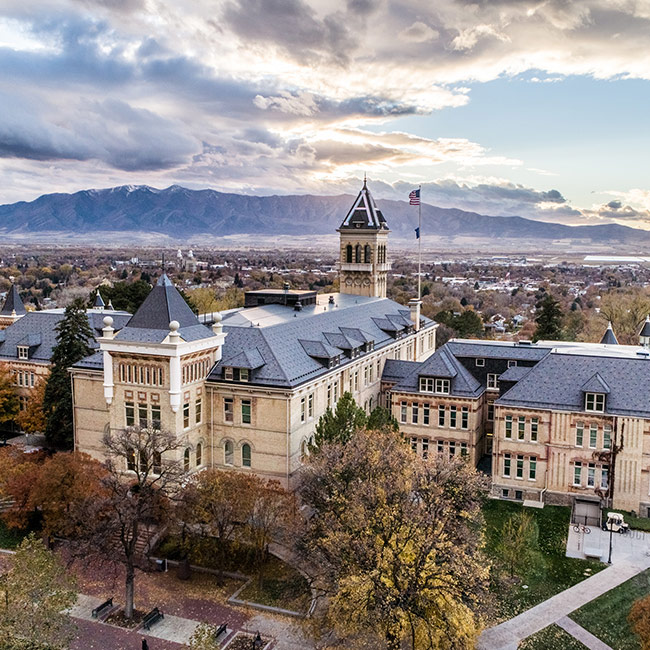About This Degree
Formed in 2002, the Department of Environment and Society is the first of its kind in a college of natural resources in this country and has served as a model for the development of similar departments at other institutions of higher learning.
The recreation resource management program is a professional degree aimed at students interested in managing outdoor recreation settings, such as public forests and rangelands, state and national parks, and wilderness areas. An understanding of both the land itself and the people who visit these areas is critical in recreation professionals. The goal of the program is to train people to manage public land to provide high-quality experiences for visitors while protecting and preserving the land at the same time.
Recreation resource management graduates are familiar with a variety of land and water management issues, are grounded in social science, and are familiar with research methods and statistical analyses. USU is located within half a day’s drive of six national parks, putting students in close proximity with field study opportunities at some of the most beautiful and most commonly visited recreation sites in the world.
ADVISING
At a Glance
College: S.J. & Jessie E. Quinney College of Natural Resources
Department: Environment and Society Department
USU Locations:
- Logan campus
Program Requirements
Career And Outcomes
Career Opportunities
Graduates in recreation resource management can pursue the following careers:
- Environmental interpreters
- Recreation planners
- Park rangers
- Monitors of environmental quality
- Tourism management and development
- Environmental visitor education
- Sustainability in nature-based tourism
- Trail crew supervisors
- Ski area employees
- Visitor center directors
- Wilderness rangers
Job Outlook
USU Locations

LOGAN CAMPUS
Admission
Admission Requirements
Applicants from various undergraduate backgrounds may be considered. Depending on the student’s desired area of research, certain prerequisite courses may be required.
To be accepted to the program, it is recommended that applicants first contact a specific faculty member with whom they are interested in working. If the faculty member is accepting graduate students and agrees to work with the student, the student can then apply by completing the following application requirements:
Application Requirements:
- Complete the online application
- Pay the $55 application fee
- Score at or above the 40th percentile on in the GRE
- Have a 3.2 or higher GPA on your last 60 semester or 90 quarter credits
- Provide transcripts of all college/university credits
- Provide three contacts for letters of recommendation
International students have additional admissions requirements.
Deadlines
The department has the following deadline:
- Fall semester – February 15
The degree programs in the Department of Environment and Society have rolling admission, meaning the department will continue to consider and accept applications until the program is full. The time it takes to process an application is primarily dependent on the speed with which the School of Graduate Studies receives letters of recommendation, transcripts, and test scores. For most students, this process may take six to eight weeks. Applicants should plan accordingly.
Program Requirements
Students must prepare and submit an article or other written product for publication by the time they graduate.
Plan Options
Students can receive the MS by pursuing one of two options:
- In the Plan A option, students complete graduate-level coursework and must write a thesis.
- The Plan B option requires the production of a paper or creative work of art and is expected to reflect equivalent scholarship standards as a thesis.
Financial Aid
The Department of Environment and Society provides funding for most of its graduate students through research assistantships, available through professors having contracts, grants, or other awards.
A variety of funding opportunities are available on the graduate school website.
Take The Next Step
How to Apply
View our step-by-step guide on how to become an Aggie.
Request Information
Contact the School of Graduate Studies to ask questions or receive more information.
Cost and Funding
Calculate the cost of graduate school and learn about funding opportunities.
You May Also Be Interested In

Ecology
Work on exciting research projects with renowned faculty studying ecology through the lens of a variety of different scientific disciplines.

Environment and Society
Learn how human activities affect the natural environment and help make changes in policy, land management, and human behavior to reduce society’s impact on the natural world.

Environmental Planning
Prepare for a career helping communities with growth and development in a unique program that focuses on large-scale planning of entire geographic regions.

Master of Natural Resources
Earn a master’s as a working professional as you take courses to help you become a manager and decision maker in the natural resources field.

